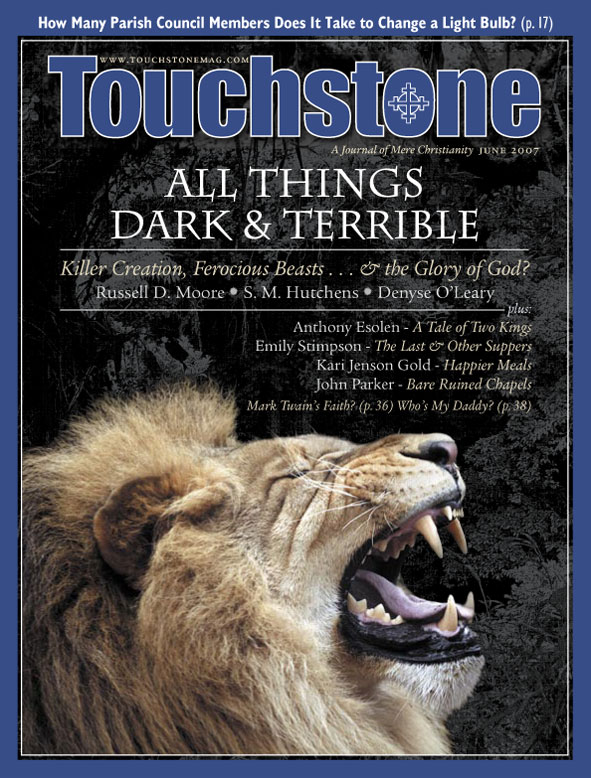All Things Dark & Terrible
Our Fearful Fascination with Wild Things & Other Monsters of God
by Russell D. Moore
Wild dogs probably devoured the crucified body of Jesus, a liberal biblical scholar announced several years ago, but it was not his infidelity about the Resurrection that was so rattling. Christianity has been battling such claims since the perjured testimony of the guards at Jesus’ tomb. More distressing was the scholar’s image of Jesus’ body as food for scavenging carnivores.
This image is disturbing for a reason, and it points toward a problem for Christianity that is more ancient and more problematic than the naturalistic assumptions found in modern biblical criticism or in the reigning Darwinian scientific paradigm: natural evil. In short, why is it that wild dogs scavenge any bodies anywhere?
For this reason, Christians must understand that apologetic attempts based on general revelation, including natural theologies and the Intelligent Design (ID) movement, cannot rest their arguments on nature alone. Without a biblical understanding of the horrors of nature—including something as “natural” as animal predation—a natural theology leaves us with a skewed picture of the Creator and the meaning of life itself.
Being Meat
It is one thing to be dead. It is another thing to be meat.
So argues naturist David Quammen, as he asks in his recent book, Monster of God: The Man-Eating Predator in the Jungles of History and the Mind, why it is more disturbing to have a loved one eaten by a bear than killed in an automobile accident. Such a gruesome thought has never occurred to most of us, probably because our encounter with predatory animals is limited to watching them safely behind the bars of a zoo, or flickering across the television screen on the Discovery Channel.
And yet we are fascinated nonetheless by these predatory beasts. Television ratings spike dramatically when the networks show some version of “When Animals Attack.” And it is not surprising that Peter Jackson’s 2005 remake of King Kong took in over half a billion dollars in receipts worldwide. A giant bellowing gorilla rampaging through Manhattan just seems to get our attention.
This is especially true of men, who, like Quammen, often trek after animal predators either in real forests or in their imaginations. Why do little boys (and their brothers, fathers, and grandfathers) so love to think about dangerous animals? Paleontologist Stephen Jay Gould dismissed as “Jungian nonsense” any idea that little boys’ love for dinosaurs and other dangerous monsters might be archetypal and universal. Instead, he argued, dinosaur mania is the result of commercialization and consumer hype.
I’m not convinced. It seems that children (and especially boys) from virtually every culture and every era, including children who have never seen television and wouldn’t know Barney the Dinosaur from Barney Rubble, have had their hearts set racing at the thought of such creatures. Why?
Russell D. Moore is president of the Ethics and Religious Liberty Commission of the Southern Baptist Convention. He is a senior editor of Touchstone.
subscription options
Order
Print/Online Subscription

Get six issues (one year) of Touchstone PLUS full online access including pdf downloads for only $39.95. That's only $3.34 per month!
Order
Online Only
Subscription

Get a one-year full-access subscription to the Touchstone online archives for only $19.95. That's only $1.66 per month!
bulk subscriptions
Order Touchstone subscriptions in bulk and save $10 per sub! Each subscription includes 6 issues of Touchstone plus full online access to touchstonemag.com—including archives, videos, and pdf downloads of recent issues for only $29.95 each! Great for churches or study groups.
Transactions will be processed on a secure server.
more from the online archives

14.1—January/February 2001
The Christian Heart of Fatherhood
The Place of Marriage, Authority & Service in the Recovery of Fatherhood by John M. Haas
calling all readers
Please Donate
"There are magazines worth reading but few worth saving . . . Touchstone is just such a magazine."
—Alice von Hildebrand
"Here we do not concede one square millimeter of territory to falsehood, folly, contemporary sentimentality, or fashion. We speak the truth, and let God be our judge. . . . Touchstone is the one committedly Christian conservative journal."
—Anthony Esolen, Touchstone senior editor









